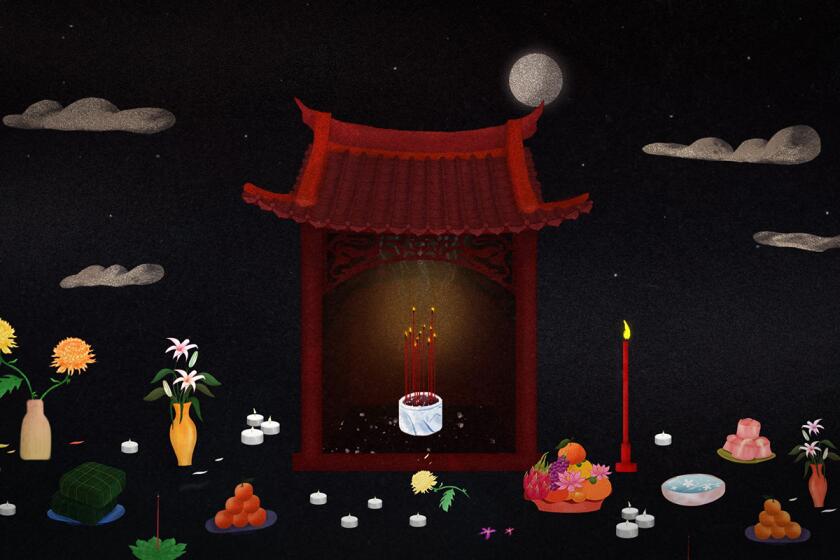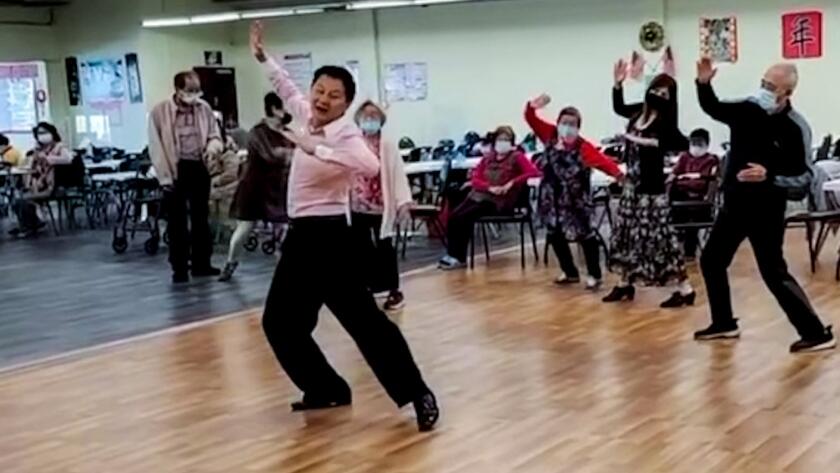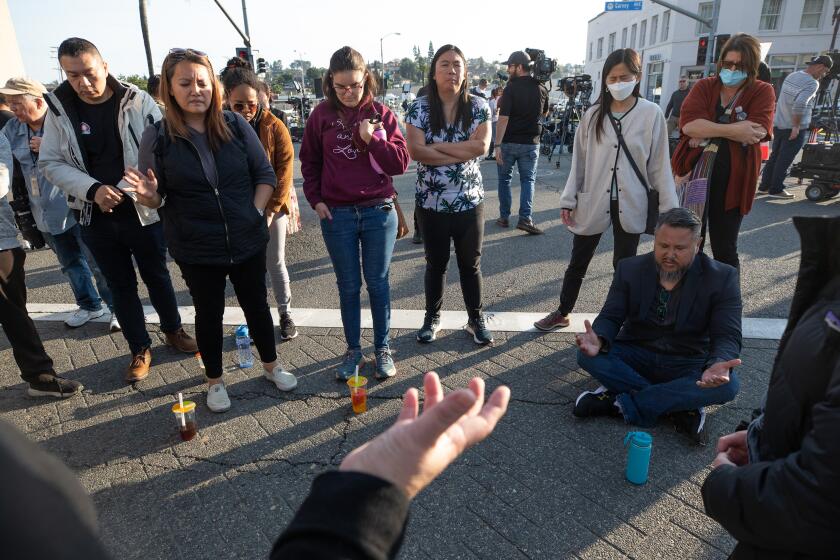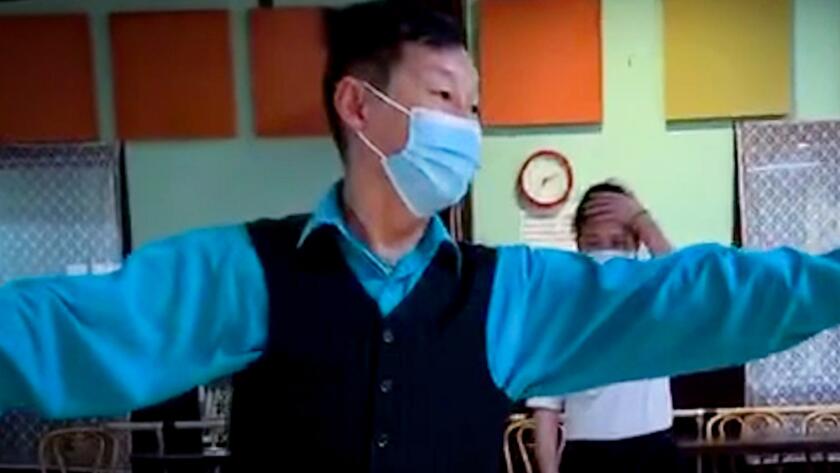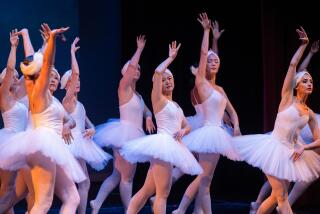Daughter of slain Monterey Park dance hall manager plans to carry on his legacy
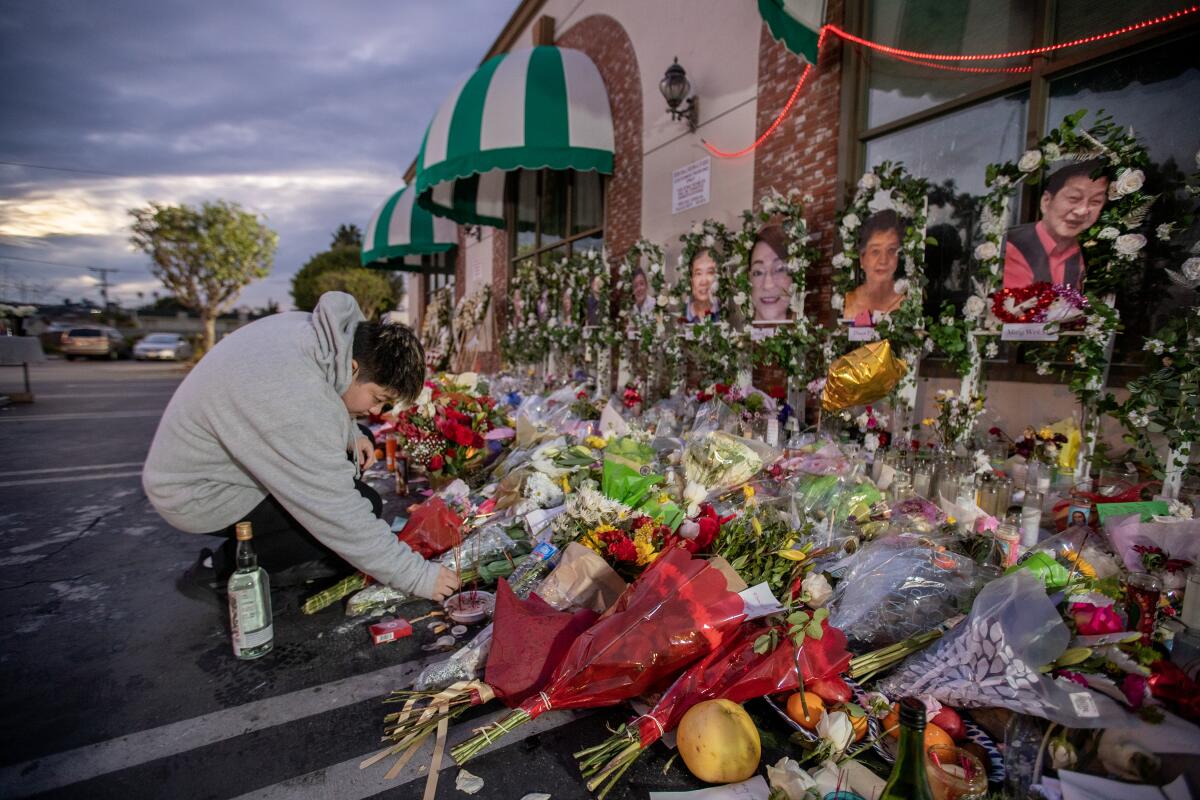
- Share via
Mary Ma holds three lighted incense sticks in front of the almost life-size photo of her father displayed outside Star Ballroom Dance Studio in Monterey Park.
She has been in this parking lot, walked by this exact spot, dozens of times — but never like this.
Behind piles of flowers, cards and candles left for Ming Wei Ma, the beloved manager and longtime leader of the dance hall, Mary quietly talks to her dad, telling him he no longer has to worry. Then she pours some of his favorite Chinese liquor on the asphalt and lights him a cigarette — his preferred brand — as an offering before the makeshift altar memorializing the mass shooting victims.
She bows three times.
“I just want him to know that I’m in good hands,” the 27-year-old said. “I do have the support system that I need to get through this, slowly.”
Ming Wei Ma, 72, was one of 11 people killed Jan. 21 at the studio when a gunman opened fire during a Lunar New Year celebration. Until his last days, Ma lived selflessly, helping lift up those around him, Mary said.
On Jan. 21, the Monterey Park community was shattered when the Star Ballroom Dance Studio became the site of one of California’s worst mass shootings in recent history. Many of the victims were studio regulars united in their passion for dance. Here are their stories.
“He was always there for me, he was always there for my brother, he was always there for the family,” she said. “He was always there for the community.”
That’s why she’s determined to carry on his legacy, hoping to eventually reopen the dance hall that came to define his later years.
“My dad always believed that there’s always good in the world and this community. ... We can’t let the bad take over,” she said. “He’s not the type of guy that would give up because one bad thing happened.”
Ming Wei Ma had been a pillar at the community-driven dance hall on West Garvey Avenue, a lifelong performer, respected employee and, at one time, part owner. Patrons and fellow dancers said he was known affectionately as “Mr. Ma,” often walking guests to their cars at night or cheering on new dancers.
But for Mary, who works in marketing, he was dad — or 老豆 (lou dau) in Cantonese. He helped her reach her goals, said “I love you” at night and always knew someone at any spot across the San Gabriel Valley where they went to eat or shop.
“He’s always going to be in my heart,” she said. Ma is survived also by his son, Ray Ma, and grandson, Isaac Ma.
Since the shooting, the studio Ma helped run for more than 15 years has been closed. It once drew Chinese, Taiwanese, Vietnamese and Filipino dance fans from the Asian American enclave just east of downtown Los Angeles, as well as others from across the Southern California immigrant diaspora who were interested in classes or competitions.
Through the years, Mary said, she saw how Star Ballroom Dance Studio provided a place of reprieve and joy for many — in particular, for people like her father: older immigrants who didn’t speak English, trying to find their place in America.
“You can’t just shut down a business like that, with so much hope, so much tradition,” she said. “That’s going to be my goal in the future — to keep this place running.”
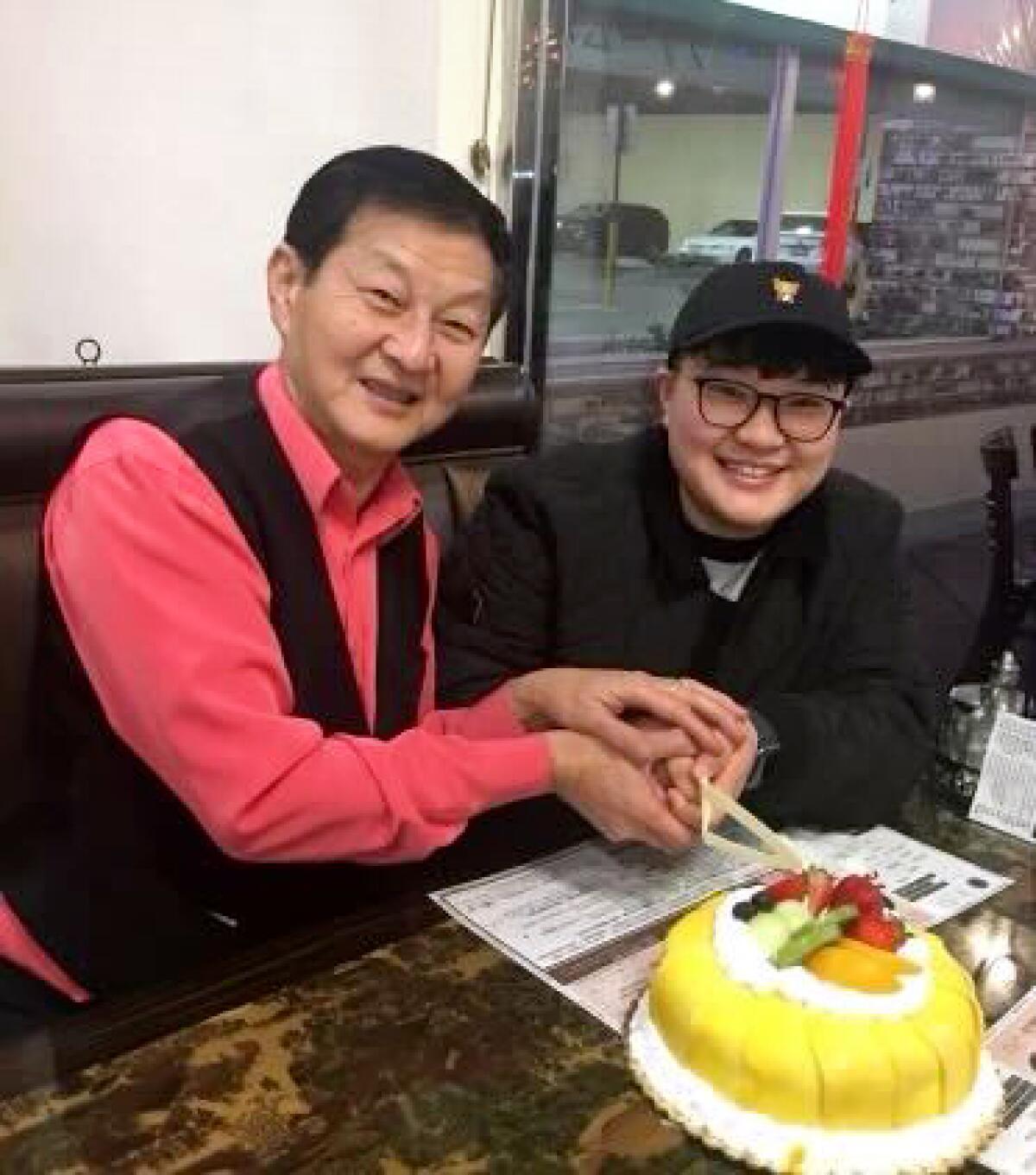
Ming Wei Ma never learned English in his almost 20 years in Monterey Park, his daughter said, but he was able to build a rich and fulfilling social life, especially at the dance hall.
She’s not sure how long it will take for her or the community to move forward, but she’s steadfast in bringing back the studio her father helped foster.
“Once we’re ready, once I’m ready … I want to be able to have that chance to keep that running, because I know that’s what he would want to see,” she said. “He felt like home at the studio, with a lot of people just like him. … It’s a place where they found warmth and support from the community; it’s where they gathered together.”
She said her father often planned cultural events at the studio, spotlighting Chinese traditions and musical groups, drawing diverse crowds and expanding people’s worldviews. She remembers people driving up from Irvine and elsewhere, just to spend a few hours at the dance hall.
“It brought people together — that’s what he strived to do,” she said.
- Share via
Ming Wei Ma volunteers at a local senior center, teaching seniors to dance. Video courtesy of Mary Ma.
And that’s how she wants to remember her father — not by his final moments. She hasn’t looked into reports that he tried to stop the shooter that tragic night, because she knows it won’t change how he should be remembered.
“In the end, he’s still a hero,” she said. Helping build and run the dance studio was a daily act of heroism, she added.
“The place wasn’t making a lot of money,” she said. “Him and [current owner] Maria kept it going because they believe it’s a place of good.”
Ming Wei Ma was originally from Wuhan, China, his daughter said, and moved to Guangzhou as a young man. He always loved to dance, performing on a popular team in China for some time but later becoming a businessman to provide for his family.
Asian Americans Advancing Justice Southern California has launched a GoFundMe campaign for the victims of the Monterey Park shooting.
For a while, he went back and forth between the U.S. and China, but about 20 years ago, he settled permanently in Southern California to be with his daughter. He later became a U.S. citizen, she said.
It was in Monterey Park that Ma got back into dancing, helping to form the community that found a home at Star Ballroom Dance Studio.
“My dad always loved dancing,” she said, adding that he also stayed active playing badminton, tennis and golf. “He just really enjoyed life.”
Ming Wei Ma, a longtime manager and teacher at Star Ballroom Dance Studio, teaches students dance moves, step-by-step. Video courtesy of Mary Ma.
Mary never got into dance but would attend karaoke nights at the studio with friends. When she got into marketing, her dad gave her business advice and even helped her get internships.
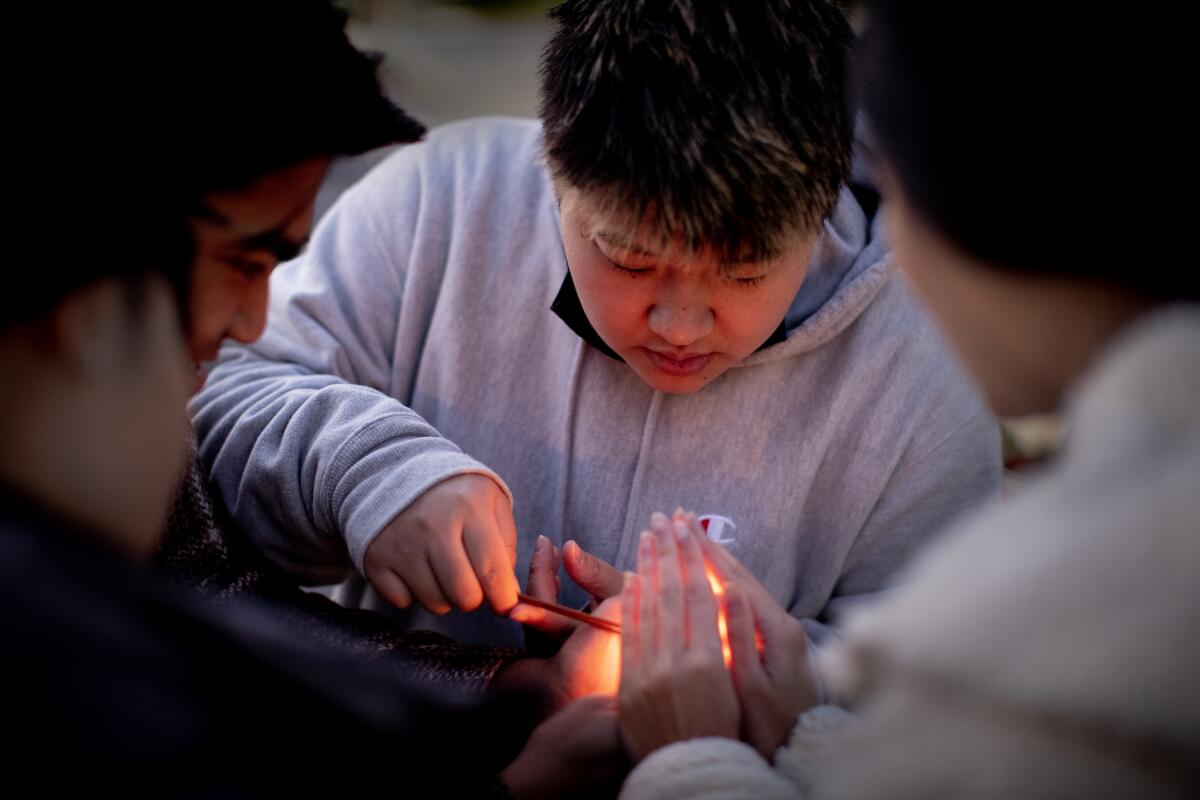
“My father was really supportive of what I wanted to do,” she said. “He never really forced me to do anything. … He just wanted me to be happy and healthy.”
In the last few days, it has been hard for her to do much of anything without being reminded of her dad — passing certain restaurants, seeing spiffy dress shirts, even finding his Costco membership card.
But she knows he would want her to be strong, so she’s keeping a favorite Chinese saying close to her heart: 珍惜眼前人 — which translates loosely to “Cherish the people in front of you.”
“That’s how I feel. I will cherish the memories and the stories I have with him in my heart,” she said. “Hopefully, one day, when I meet him in the afterlife, he’s able to tell me he’s proud.”
Staff writer Summer Lin contributed to this report.
More to Read
Sign up for Essential California
The most important California stories and recommendations in your inbox every morning.
You may occasionally receive promotional content from the Los Angeles Times.
